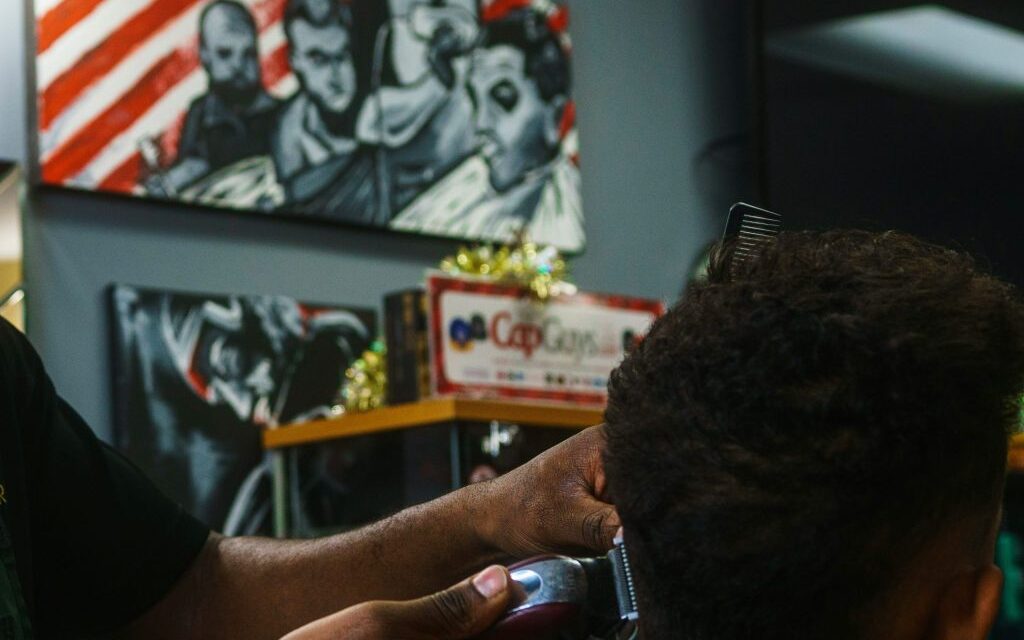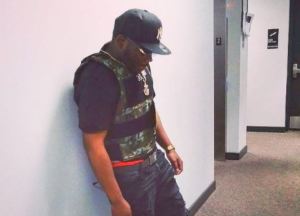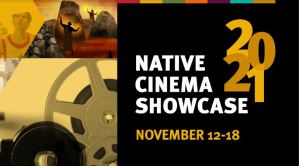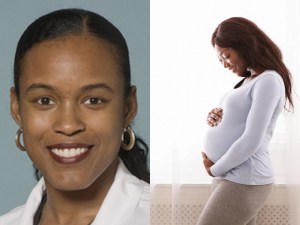By Reginald Williams
Special to the AFRO
Barbering was one of the first professions that provided a means for Black men to purchase their freedom from slavery. Historically, the Black barber shop has served as the pillar of the community. It was one of two spaces—the church being the other—where Black men gathered to socialize and strategize for community events, including hosting voter registration drives.
On the opening night of the Democratic National Convention, Stan Dorsey, owner of Ultimate DeZigns Barber & Beauty Salon in southeast Raleigh, N.C.., hosted “Black Men, Black Voices, Black Votes, & Black Victors.” In the way Black men gathered at the barber shop in the 1940s, ‘50s, and ‘60s, men from neighboring communities gathered to discuss the importance of having their voices and votes counted.
“My vote makes me accountable, not just to myself, but to my family, to my community. It also allows me to hold elected officials accountable because I have that voice,” said Richard Redding, higher education coordinator of the Minority Male Program at Wake Technical Community College.

As in days of the past, Black barber shops like Ultimate DeZigns are resurging as places that offer more than haircuts. Vibrant political conversations on topics like Project 25 often accompany the haircuts.
“Last Saturday, I had a young lady here who has three kids. She knew nothing about Project 25,” explained Dorsey. “We (men in the shop) got to talking to her about it. I told her to read just the first paragraph. When she did, she broke out crying.”
Project 2025 is the Republican Presidential Transition Project proposed to uproot the tenets and fabric of democracy.
The ominous political chatter regarding Black men either choosing against voting in the forthcoming presidential election or deciding to vote for the Republican nominee aroused David Baker’s curiosity. Baker, a district judge for Juvenile Court in Raleigh, called his longtime friend Tim Grubbs and engaged in what he thought was a personal conversation between friends. Grubbs listened and allowed his buddy the space to air his thoughts. About two weeks later, Grubbs called Baker and inquired what he planned to do regarding his concerns. With the Republican presidential candidate campaigning on the promise to give “police immunity so that they can do their jobs,” and promising Christians, “If they vote this one last time, they’ll never have to worry about voting again,” Baker wanted to coordinate a bipartisan, multi-generational group of men to discuss today’s political landscape, and what it means for democracy.
Before starting the discussion, the men grabbed their folding chairs and connected them to four barber chairs to make a circle. “What is a vote? What is it supposed to do? What is it that we think it’s supposed to do,” was the question placed on the debate floor by the moderator to unlock the evening’s conversation.
Antoine Marshall, a former candidate for the N.C. House of Representatives’s District 33, eloquently provided the historical content and context for the vote.
“The government is run by a democracy. We choose our leaders to represent us on our issue. This country is a big place. It has a very complicated system. It’s a large system—$4 trillion every year. We can’t vote on all of the issues that we all individually have; we would get nothing done. So, we elect people to speak for our interests. When you go to the ballot box, you vote on the various offices and what they represent. You’re saying this is the person I want to serve in that position to represent my values,” explained Marshall.
On the heels of Marshall’s definition, the men began intimately describing what the vote meant specifically to them.
“From my perspective, a vote is my capital. It’s my way of first acknowledging that someone did something for me to even have the right to participate in the process,” said Brandon Alexander, a real estate developer and community advocate. “If I don’t use my vote, then in my mind, I’m doing something to disgrace those people who sacrificed whatever those things were. It’s more of my way of first, acknowledging, but secondly, thanking them for the sacrifice they gave for me. So, for me, there’s no way that I’m never not going to vote.”
Frankie McInnis, a member of Men of Southeast Raleigh, an organization that supports families and community agencies in achieving their missions, echoed Alexander’s sentiment that he would never stop voting even if his candidate fails to win.
“There’s something that keeps you wanting to vote,” said McInnis, who believes people should not have their voices marginalized. “We tell ourselves that we have a voice. I think one of the worst things you can do to anybody is to ignore them. That’s one of the worst insults. My vote is saying to the whole world, ‘I’m not being ignored.’ Voting keeps me going to the ballot box because of the way it makes me feel. I may never get the candidate that I want, but I’m going to keep pulling the lever because of how it makes me feel.”
Redding said his vote kept him accountable. However, he had another reason for voting, which brought laughter to the circle.
“Another part of me is I never wanted to be that person who didn’t vote, and the candidate lost by one. In the back of my mind, I’m always thinking, ‘What if that candidate lost by one and I didn’t vote?’” said Redding.
As Grubbs and Baker intended, the age diversity (from 18 to 70-plus) represented a bridging of generations.
“I loved the diversity of age in the room,” said Redding, 57. “I believe everyone felt heard and affirmed. I felt connected and safe and excited that this place was created. It is needed.”
Javon Bell, 24, who arrived in tow with his dad, Jamie Bell, and cousin DeCota Butler, 22, agreed with Redding.
Various individuals from different generations “provided critical pieces of knowledge that can help everyone grow,” Javon Bell said. “The voice of the room was very strong and powerful. It impacted me because of the variety of opinions.”
The energy and spirit in the room were so palpable that the men decided to have a second discussion on Sept. 16. That made Dorsey happy, since he earlier expressed his hope that they could make the conversations a “big thing.”
“The evening affirmed my belief that when we come together with the intention to listen to one another, along with a willingness to share from our lived experiences, together we can solve any problem and transform our communities,” Baker said.
The post Black men, Black voices, Black votes: A barber shop conversation appeared first on AFRO American Newspapers.










